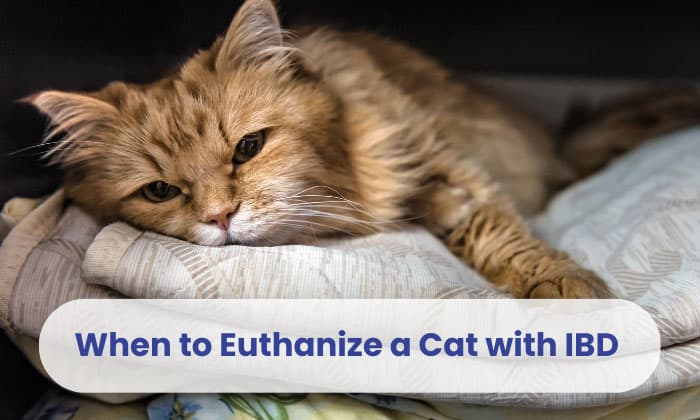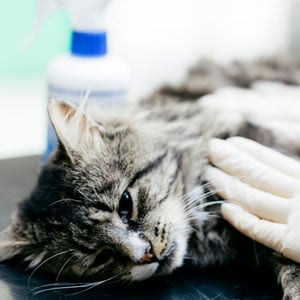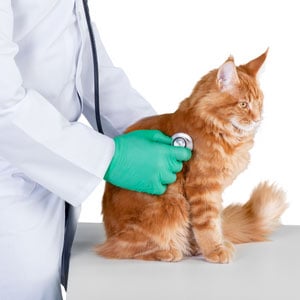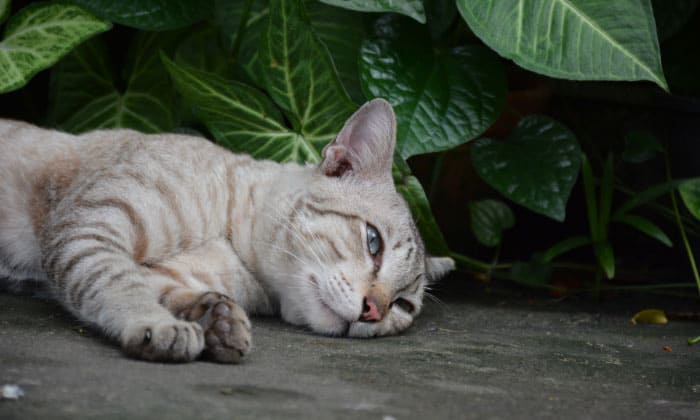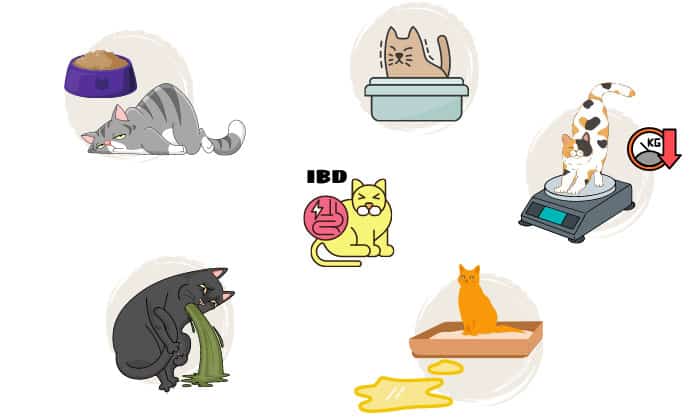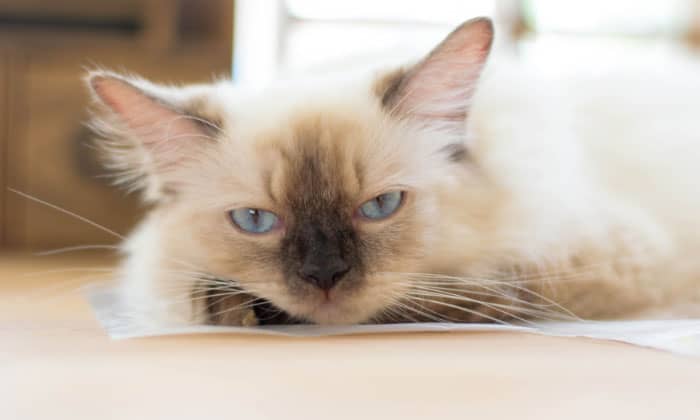Inflammatory Bowel Disease (IBD) in cats is currently one of the diseases for which there is no specific treatment.
When the inflammation is not medicated, the condition becomes chronic and agonizing for cats and worsens with time. As a result, you may not want to see your cat suffer the pain and may choose to say goodbye to your beloved cat.
So, when to euthanize a cat with IBD? This is determined by the severity of the disease, the cat’s response to treatments, and its current health conditions. Keep on reading; you’ll get more critical information in the article below.
Table of Contents
What Is IBD in Cats?
IBD stands for Inflammatory Bowel Disease, a condition affecting cats’ digestive tract. IBD is characterized by chronic irritation and inflammation of the gastrointestinal (GI) tract.
In detail, inflammatory cells invade the small intestine, stomach, and large intestine, causing the GI tract’s walls to thicken. Due to this condition, your cat will have difficulty digesting and absorbing food. Depending on the severity of the disease, your cat might suffer from chronic vomiting, diarrhea, and more symptoms related to the digestive system.
1. Causes of IBD in Cats
No research identifies the actual cause of IBD in cats. However, some of the probable causes are as follows:
- Genetic factors
- Hypersensitivity to bacteria
- Food allergies (food additives, meat proteins, preservatives, artificial colors, milk proteins, etc.)
- Parasitic infection
Carbohydrate-rich diets may make your cat more vulnerable to having IBD, while low-carbohydrate diets may minimize their risk of developing this condition.
2. Symptoms of IBD in cats
The symptoms of IBD in cats will differ depending on the digestive tract part affected.
Inflammatory bowel disease, which mainly impacts the small intestine, is the leading cause of chronic vomiting and weight loss. On the other hand, IBD, which primarily affects the colon, will result in diarrhea and with or without blood and mucous in the stool.
While IBD symptoms vary depending on the location and severity of the inflammation, the following are the most common:
- Weight loss
- Diarrhea
- Chronic or recurring vomiting
- Blood in the stool
- Lack of energy
- Lethargy
- No weight gain despite ravenous eating
- Abdominal pain
- Decreased appetite
As a result, you need to pay close attention to your cat to bring it to the vest immediately if such symptoms appear.
3. Treatment for IBD in cats
Due to the unknown cause of IBD in cats, there is no specific cure for this disease. However, metronidazole for cats with IBD is suggested, along with changes to the diet. Metronidazole is well-tolerated, but some felines may lose their appetite when they take it.
Besides, steroids for cats with IBD are highly effective anti-inflammatory and immunosuppressive agents. This drug may be advised, either alone or in conjunction with metronidazole.
There are several potential side effects of corticosteroids in cats, including diabetes and immune suppression, so you must closely monitor your cat while giving him corticosteroids. For your cat’s safety, always administer the medication as prescribed by your vet.
3 Things to Consider Before Deciding to Euthanize a Cat
If a cat with inflammatory bowel disease is not too far along in its illness, then it can be saved with your assistance, and the answer to the question “when is it time to euthanize a cat with IBD” depends on this issue.
The first important thing is to double-check these 3 things before deciding to put your cat to sleep.
1. How Severe Is Your Cat’s IBD?
Inflammatory bowel disease (IBD) in cats typically progresses in three stages. The onset of acute inflammation and intestinal damage is the first stage. Cats at this stage may exhibit symptoms such as weight loss, vomiting, and diarrhea.
The next stage is the development of chronic inflammation, characterized by more persistent symptoms. The end stage inflammatory bowel disease in cats is the development of fibrosis, which causes significant damage to the intestinal wall and impairs nutrient absorption.
If you notice that your cat is beginning to show signs of IBD, you should do everything in your power to save him while there is still a chance that he can be cured.
2. Have You Used the Right Treatment to Save Your Cat?
If you have been attempting to treat your cat on your own, and those treatments have not been successful, immediately stop what you are doing and take your cat to a veterinary clinic.
Your veterinarian will provide you with a treatment regimen to save your cat. Let your vet know immediately if none of these methods are helping so they can select a different treatment method.
3. Cat’s Age – A Factor That Affects the Condition
The cat’s age is another factor that can affect the progression of the disease. During treatment, it is essential to pay close attention to the cat’s facial expression.
IBD can affect cats of any age, but it typically affects older and middle-aged cats between 5 and 12 years old.
Euthanasia is a better choice to consider if your cat is too old to withstand the treatment regimen due to the stress it will cause both physically and emotionally.
When to Put a Cat with IBD Down?
Many cat owners struggle with the question of when to euthanize a cat with IBD or euthanize a cat with cancer. Even though it’s going to be painful for you to have to do this, it might be the best option for your cat to have a peaceful passing.
The 5 below symptoms indicate that your cat’s IBD has progressed to a point where it is no longer treatable, and it is time for you to say goodbye to your cat.
1. Extreme Loss of Appetite
Reduced appetite is a common symptom of inflammatory bowel disease in felines. Suppose your cat’s behavior worsens to the point where the appetite stimulant is no longer effective.
Decreased appetite can result in your IBD cat starving to death; thus, if it is unable to provide adequate nutrition for your cat, euthanasia should be considered at this time.
2. Uncontrolled Vomiting or Diarrhea
IBD can cause vomiting and diarrhea in cats. Your cat’s vomiting or diarrhea continues for more than twelve hours or becomes nearly impossible to control. This sign is one of the symptoms of severe inflammatory bowel disease in cats.
Constant vomiting and diarrhea that do not improve with treatment may indicate that it may be time for euthanasia.
3. Urinary and Fecal Incontinence
Urinary incontinence occurs when the urinary system does not function normally. The cat will frequently urinate at inappropriate times, and the highly acidic urine causes a rash on the skin around the genital areas.
Besides, bowel incontinence is also one of the severe symptoms of IBD in cats. You may notice redness, inflammation, or drainage from your cat’s rectum at this time.
It may be time to consider euthanasia for a cat if it suffers from urinary or fecal incontinence that cannot be treated or if it demonstrates other severe symptoms simultaneously.
4. Uncontrolled and Severe Weight Loss
Felines are small enough that any loss of weight is easily apparent. After losing weight, your cat’s hip bones, and spine may become more visible. It’s possible that the skin will be too big for the body and will hang loosely. The fur on your cat may become lifeless and brittle, and it may even start to fall out.
In cats with IBD, severe weight loss alongside other symptoms may indicate that the disease cannot be cured. Sadly, we must part ways at this time.
5. Severe Bleeding When Defecating
The presence of a large amount of blood in a cat’s stool after the cat has defecated, combined with other serious symptoms such as repeated vomiting, severe diarrhea, pain, weakness, lack of energy, and so on. These symptoms occur at the same time, indicating an advanced stage of IBD in cats.
At this point, you face significant challenges in treating your pet. Stay by his side during his final days, take care of him, and show him your love so he may pass away peacefully.
Frequently Asked Questions
Choosing to put down your pet is a painful experience. A consultation with your vet is still recommended, as is further research into this illness. Here are some issues that may help you.
How Long Do Cats Live with IBD?
The life expectancy for cats with IBD is supposed to be many years for some cats with a good prognosis. There is currently no cure for inflammatory bowel disease in cats; however, the condition can usually be controlled. This will allow your cat to live a comfortable and healthy life for many years.
However, in some cases, this disease can progress rapidly and become so severe that the cat does not live for a long time after it has been diagnosed.
Is IBD in Cats Painful?
IBD can cause pain in cats, such as diarrhea-related abdominal cramping. Nevertheless, your cat is more likely to experience discomfort than severe pain due to IBD. If you suspect your feline companion is in pain, keep an eye out for these signs and contact your veterinarian.
What Happens If IBD Is Left Untreated in Cats?
IBD is a chronic inflammatory disorder of the lining of the small intestine. It can lead to the formation of scar tissue and even lymphoma if left untreated.
High-grade lymphoma in cats is extremely hard to cure; only 25-50% of cases go into remission. Most cats only enjoy this period of health for 2-9 months before suffering from severe symptoms again.
Cats with feline leukemia who develop mediastinal lymphoma can live only for more than three months to half a year.
Can IBD Be Passed on to Other Cats?
No, IBD is not contagious. Inflammatory bowel disease develops whenever the intestinal immune system becomes overly active. Some experts believe that certain bacterial or viral infections may contribute to the syndrome, but most research points to a genetic basis.
Can IBD Kill a Cat?
There is no research indicating that IBD can kill cats. IBD in cats, however, is not curable, and your cat may experience discomfort as the condition worsens.
Conclusion
IBD is a dangerous disease in cats. It may result in diarrhea, vomiting, blood in the stool, and vomiting. As the disease’s cause is still unknown, no treatment is available. When to euthanize a cat with IBD depends on how severe your cat’s condition is.
Most cats diagnosed with this condition can survive within the next few years. In some cases, however, IBD in cats can become so severe that your cat’s health becomes weak, which can even cause death. In such cases, you might have no choice but to look into euthanasia or hospice care.
As a result, you should monitor your cat’s health regularly to have convenient treatment options if the disease is detected early.
Read more: When to euthanize for a cat with kidney failure?

I am Amy Sawy, a Doctor of Veterinary Medicine (DVM) graduate from the University of Kansas. y husband, Dr. Plummer, and I own a veterinary clinic in Phillipsburg, Kansas. In addition to my professional background, I am a devoted pet owner myself, with a household that includes dogs, rodents, and most notably, cats – a total of five felines in my home.
In 2020, I joined an organization as a professional writer, leveraging my experience and collaborating with my team to deliver the most valuable information for your cat’s care.


